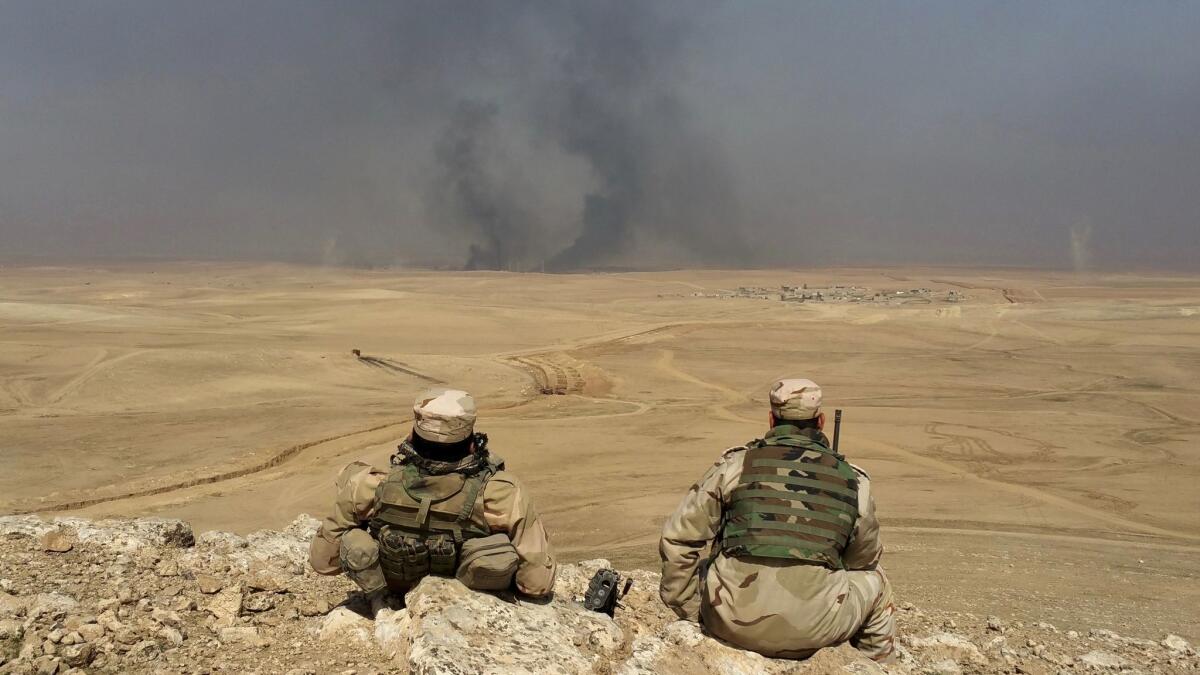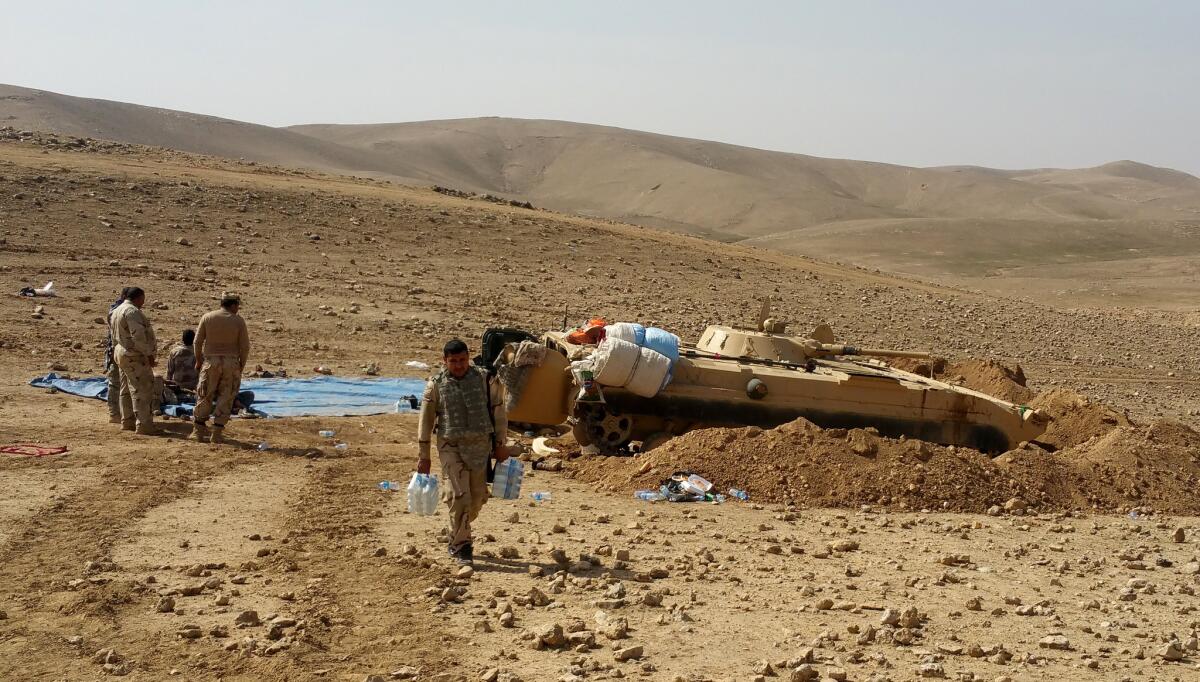Iraqi commanders say a spot in the desert is key to winning control of the city of Mosul

- Share via
Reporting from MT. ATSHAN, Iraq — The soldiers milled around the hilltop, taking turns to look through binoculars at the village burning in the valley below. Beside them lay the tanks of the 36th Armored Brigade, their fronts buried in the desert sand. They trained their turrets toward the buildings of Mosul that stretched along the horizon.
At first glance, there was little to explain why the tanks and armor, part of the Iraqi army’s 9th Division, had wandered to this desolate corner of the desert. But it is here, commanders say, far from the punishing street-to-street fighting in the city, that the battle for Mosul will be won.
The division’s orders are to push north from Mt. Atshan and seize the village of Badush, 10 miles west of Mosul.
(Badush is home to the eponymous prison where Islamic State massacred about 670 Shiite Muslim inmates in mid-2014. The militant group espouses a hard-line Sunni interpretation of Islam that counts Shiites as infidels who should be killed.)
A takeover of Badush would sever Highway 47, a vital road linking Mosul to the Islamic State-held city of Tall Afar, about 40 miles west of Mosul and now cut off from the Syrian border by Shiite-dominated militias known as the Popular Mobilization Units.
Taking the road would further restrict the militants’ movements, denying them the use of a vital supply route as well as a pathway to make their escape.
“Once we get Badush, we’ll finish the noose around them in Mosul,” saidBrig. Gen. Mustafa Sabah, a sardonic 51-year-old officer who cracked jokes with his subordinates as he ate a lunch of chicken and rice.
“Where will they go after that?” Sabah asked. “They can’t leave the city, and if they do, we have them.”
Iraq and coalition forces had captured east Mosul, Islamic State’s de facto capital, and in February launched the offensive to retake the western part of the city.
Preliminary plans for the Mosul offensive would have left the city’s western flank relatively unguarded in a bid to reduce casualties and draw the jihadis into what Iraqi military planners had called a “kill box” between Mosul and Tall Afar.
Instead, plans now call for the army to advance from the west even as special forces units clear the city from the south.
The open terrain doesn’t present the same challenges of street fighting, but Islamic State still poses a threat.

“Islamic State has dug tunnels in the mountain range here,” said Col. Nassim Kathem of the 36th Armored Brigade. The jihadis used the tunnels to hide from Iraqi and coalition warplanes, he said, and then emerged to attack when troops drew near.
He pointed to a trench slicing through a nearby hilltop.
“It’s a vicious fight when they see us.”
Referring to the group by its Arabic acronym, he said, “We killed eight Daesh guys there the other day.”
The nearby presence of residents from Mosul and the surrounding villages fleeing the violence means commanders are often unable to bring the full military might of the 36th Brigade to bear on Islamic State targets.
If it weren’t for the proximity between the jihadis and civilians, “this would be an easy battle,” said Lt. Col. Muhannad Taai, a commander with the Abbas Fighting Division, a paramilitary group that fights alongside the 36th Brigade.
“We’re being very careful, because we have to protect [civilians] and make sure Daesh doesn’t attack them as they escape,” Taai said.
As he spoke one day this week, his walkie-talkie crackled with the voice of a soldier reciting the coordinates of a convoy of civilian vehicles.
“If any Daesh vehicle tries to attack them, destroy it,” came a voice in reply.
Scores of crude explosive devices buried near roads or in the desert fields by Islamic State had already killed a number of civilians, Taai said.
“Yesterday a family got hit by an [improvised explosive device] as they were escaping,” he said. “One of their daughters died, and the other will probably have to have a hand amputated.”
Moments later, troops halted a ragtag group of residents piled in civilian vehicles from passing through an intersection on their way to a refugee aid point.
“There are three IEDs. Our engineering crews caught them when those cars showed up. We’ll do a controlled explosion and then let the civilians pass,” said Col. Ali Duwari, another commander, squinting at the line of vehicles with a walkie-talkie in hand.
In the distance, a bomb squad member approached one of the explosive canisters and connected a detonator and fuse before running away. A tense 30 seconds later, the first bomb exploded with a shock wave that kicked up an incongruously graceful bloom of sand.
Once all three bombs were destroyed, the vehicles were directed to a gathering point for the displaced, where a gaggle of tractors, pickup trucks and farm equipment was parked near flocks of sheep munching on the last vestiges of weeds.
To one side of the dirt path, women in brightly colored scarves squatted with their children, a trio of black and white cows lazily waving their tail in their midst.
Opposite sat the men, arrayed in a shambolic triangle around a soldier. They waited for their names to be punched into a database so they could be checked for connections to Islamic State.
Two days later, Sabah said that the brigade had advanced from its hilltop to within two miles of Badush and that his units had fire control over the road.
He stopped for a moment to inform an officer on the phone that another village had been secured and was now sadeeqah (friendly).
“We’re almost there,” he said.
Bulos is a special correspondent.
ALSO
Kremlin says Syrian forces regain Palmyra
North Korean diplomat says Kim Jong Nam was killed by a heart attack, not a nerve agent
Trump’s Russian honeymoon may be over as Moscow media put him in the deep freeze
More to Read
Sign up for Essential California
The most important California stories and recommendations in your inbox every morning.
You may occasionally receive promotional content from the Los Angeles Times.











